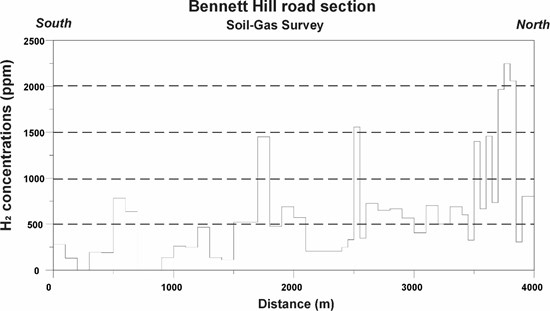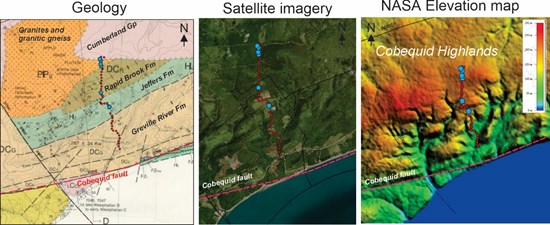
QIMC Extends Natural Hydrogen Footprint in Nova Scotia with 2nd Major Discovery at East Advocate - 4km Line with Soil Gas Samples Averaging 623 Ppm with a High of 2,247 Ppm
Published by Todd Bush on September 3, 2025
Montreal, Quebec -- (Newsfile Corp. - September 3, 2025) - Quebec Innovative Materials Corp. (CSE: QIMC) (OTCQB: QIMCF) (FSE: 7FJ) ("QIMC" or the "Company") is pleased to announce the confirmation of a second major natural hydrogen zone in Nova Scotia. Following the Company's record-setting results at West Advocate, QIMC and its research partner INRS have now identified a continuous 4 km anomalous line at Eastern Advocate (Bennett Hill Road section), averaging 623 ppm H₂ with a high of 2,247 ppm.
These results underscore Nova Scotia's emergence as a district-scale natural hydrogen hub in North America, with further results pending from additional at Southampton and Springhill.
>> In Other News: Hydrogen Hubs Hit $10B by 2035: The Real Projects Behind the Numbers
Discovery Highlights - East Advocate
- 4 km anomalous transect northeast of the West Advocate discovery.
- 47 soil-gas samples collected and analyzed on-site by INRS.
- Average concentration: 623 ppm H₂; median 520 ppm H₂.
- Peak value: 2,247 ppm H₂.
- Frequency: 36% of samples between 500-1,000 ppm and 11% between 1,000-2,000 ppm.
"These Eastern Advocate results firmly establish that Nova Scotia hosts not just isolated anomalies, but an expanding hydrogen system with scale," said John Karagiannidis, President & CEO of QIMC. "With two confirmed multi-kilometre zones in less than two months, and more results pending at Southampton and Springhill, QIMC is leading the charge in unlocking Nova Scotia as one of the most promising natural hydrogen addresses in North America."
Geological Context
To continue the evaluation of the natural hydrogen potential of the Cobequid Fault Zone (Nova Scotia), the QIMC and INRS team completed a second transect located northeast of the Reid section of West-Advocate. One of the sub-objectives of the study is to assess the relative scale of hydrogen transfer processes along the large Cobequid fault zone.
The work was carried out from 18 to 20 July 2025 under sunny weather conditions that were particularly favourable for the collection of Soil-Gas samples (average temperature of 25oC, average atmospheric pressure of 989 HPa and average relative humidity of 64%). A total of 47 samples were collected from a 4 km section along Bennett Hill Road located in the East Advocate area.
The mean and median hydrogen concentrations measured in the soils of this sector are particularly high with values of 623 and 520 ppm respectively. Measured values along the Bennett Hill section range from 0 to 2247 ppm.
500-1000 ppm: 17 samples (36%)
1000-2000 ppm: 5 samples (11%)
More than 2000 ppm: 2 samples (4.3%)

**Figure 1**. Variation in H₂ concentrations in soils in the Bennett Hill Road section (East Advocate, Nova Scotia). To view an enhanced version of this graphic, please visit: https://images.newsfilecorp.com/files/7968/264898_767b83e1449f39ac_001full.jpg
To view an enhanced version of this graphic, please visit: https://images.newsfilecorp.com/files/7968/264898_767b83e1449f39ac_001full.jpg
These high concentrations of hydrogen in the soils of Bennett Hill are observed 12 km northeast of the Reid-Eatonville Zone of the West-Advocate sector. The observation of strong H₂ anomalies in the Bennet Hill area suggests, a priori, that the system responsible for hydrogen production could be of multi-kilometre extension. This scenario is plausible considering the importance of the Cobequid Fault Zone in Nova Scotia and the presence of igneous rocks potentially a source of hydrogen in the Cobequid Highlands.
The highest hydrogen concentrations are observed mainly in the Cobequid Highlands area and more specifically in a complex geological domain characterized by the presence of Hadrynian (Proterozoic) volcanic rocks of the Jeffers Fm, Devonian sedimentary rocks of the Rapid Brook Fm, granitic rocks of the Apple River pluton. All these rocks show cataclastic facies suggesting the presence of secondary structures (faults) probably associated with the deformation corridor of the main Cobequid Fault. It is possible that the increase in porosity and permeability of cataclastic rocks could explain, among other things, the hydrogen enrichment observed in the soils of this area. Subsequent petrophysical studies will have to verify this hypothesis.

Figure 2. Location map of the Bennett Hill section in the East Advocate area. Bedrock geological maps Novascotia.ca, satellite imagery from World Imagery, and NASA DEM Elevation data. To view an enhanced version of this graphic, please visit: https://images.newsfilecorp.com/files/7968/264898_767b83e1449f39ac_002full.jpg
To view an enhanced version of this graphic, please visit: https://images.newsfilecorp.com/files/7968/264898_767b83e1449f39ac_002full.jpg
"These Bennett Hill values reinforce the interpretation of the Cobequid Fault as a first-order hydrogen system," noted Prof. Richer-LaFlèche, INRS who supervised the field work and analysis. "The structural complexity, combined with igneous and sedimentary units, provides the perfect environment for large-scale hydrogen generation and retention."
Next Steps
With discoveries at both West Advocate (5,558 ppm peak) and East Advocate (4 km continuous line - 2,247 ppm peak), QIMC is further consolidating its land holdings and preparing for Phase 2 and Phase 3 beginning early September.
"Nova Scotia is no longer just prospective - it is emerging as a hydrogen hub for North America," added Karagiannidis. "QIMC will continue advancing aggressively, with Southampton and Springhill results expected to further expand the scale of this district."
Acknowledgements
QIMC wishes to sincerely thank the Advocate community for their support, as well as the Nova Scotia Mineral Management team.
"With this discovery, QIMC is positioned at the forefront of natural hydrogen exploration in North America," added John Karagiannidis. "We see this as a transformative opportunity for our shareholders and for Nova Scotia, as we advance exploration and help unlock the clean energy potential of natural hydrogen."
About Pr. Marc Richer-LaFlèche, P.Geo.
Pr. Richer-Laflèche, a qualified expert in hydrogen exploration, has reviewed, read and approved the technical content presented in this press release. Pr. Richer-Laflèche confirms that the methodologies employed, data presented, and interpretations made conform to current industry practices and standards relating to hydrogen exploration.
About QIMC
Québec Innovative Materials Corp. is a mineral exploration and development company dedicated to exploring and harnessing the potential of North America's abundant resources. With properties in Ontario, Québec, Nova Scotia and Minnesota (US), QIMC is focused on specializing in the exploration of white (natural) hydrogen and high-grade silica deposits. QIMC is committed to sustainable practices and innovation. With a focus on environmental stewardship and cutting-edge extraction technology, we aim to unlock the full potential of these materials to drive forward clean energy solutions to power the AI and carbon-neutral economy and contribute to a more sustainable future.
QUÉBEC INNOVATIVE MATERIALS CORP.
John KaragiannidisChief Executive Officer
Subscribe to the newsletter
Daily decarbonization data and news delivered to your inbox
Follow the money flow of climate, technology, and energy investments to uncover new opportunities and jobs.
Latest issues
-
$47M Just Poured Into This SAF Producer
Inside This Issue 💰 LanzaJet Announces $47M in New Capital and First Close of Equity Round at $650M Pre-Money Valuation 🚢 Maersk's Ethanol Bet Could Reshape U.S. Fuel Markets 🪨 Canada Nickel and t...
-
Kita's $29M Bet Signals Carbon Insurance Is Here
Inside This Issue 🛡️ Kita's $29M Bet Signals Carbon Insurance Is Here 🏗️ CCI BioEnergy Selects Arcadis As Design-Engineer Partner Under Master Service Agreement 🤝 Tapestry and Climeworks Announce ...
-
Cummins Quit Electrolyzers. Electric Hydrogen Didn't.
Inside This Issue ⚡ Cummins Quit Electrolyzers. Electric Hydrogen Didn't. 🧪 New Electrified Method Captures Carbon Dioxide From Air 🌾 Iowa Could Be on the Cusp of a Hydrogen Rush; Lawmakers Weigh ...
Company Announcements
-
HOUSTON and OXFORD, England/PRNewswire/ -- Velocys today announced that it has implemented manufacturing and delivery efficiencies that reduce total investment cost for its microFTL™ technology by ...
-
Agreement signals ongoing growth of Sustainable Aviation Fuel market GREAT FALLS, Mont. and BOSTON, Feb. 19, 2026 /PRNewswire/ -- Montana Renewables, LLC (MRL) and World Energy Clean Fuels LLC (Wo...
-
BASF Launches Circalo: Low Carbon Intensity Crops To Help Ethanol Producers Capture Value Under 45Z
RESEARCH TRIANGLE PARK, NC, February 19, 2026 – BASF has introduced Circalo™: Low Carbon Intensity Crops, a comprehensive, unified platform designed to connect farmers, agronomists and ethanol prod...
-
International Airlines Group (IAG), Shell, Groupe ADP, LanzaTech, and Mitsui make additional investments to support LanzaJet's growth and commercial deployment of its proprietary Alcohol-to-Jet (AT...